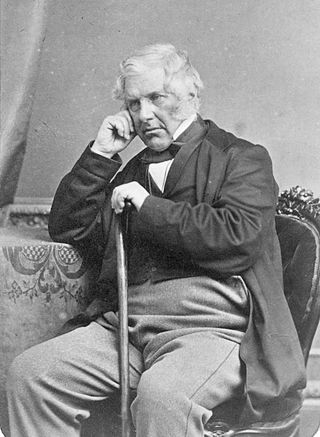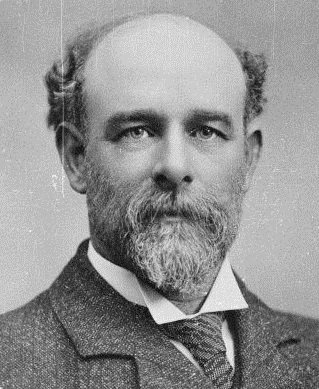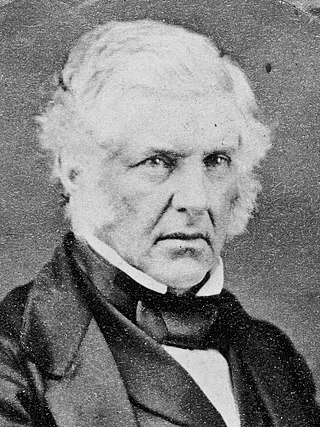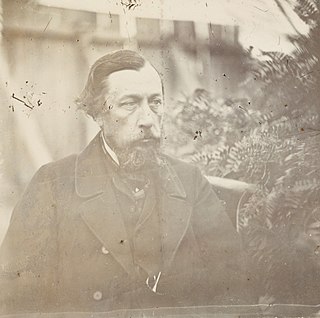
Henry Sewell was a New Zealand politician. He was a notable campaigner for New Zealand self-government, and is generally regarded as having been the country's first premier, having led the Sewell Ministry in 1856. He later served as Colonial Treasurer (1856–1859), as Attorney-General (1861–1862), and twice as Minister of Justice.
James Frederick Stuart-Wortley JP was a politician in New Zealand and the UK. He was New Zealand's inaugural Baby of the House and remains the youngest member of parliament in the country's history; in fact he was too young to even be legally elected.

James Edward FitzGerald was a New Zealand politician. According to some historians, he should be considered the country's first premier, although a more conventional view is that neither he nor his successor should properly be given that title. He was a notable campaigner for New Zealand self-governance. He was the first Superintendent of the Canterbury Province.
The 2nd New Zealand Parliament was a term of the Parliament of New Zealand. It opened on 15 April 1856, following New Zealand's 1855 election. It was dissolved on 5 November 1860 in preparation for 1860–61 election. The 2nd Parliament was the first under which New Zealand had responsible government, meaning that unlike previously, the Cabinet was chosen by Parliament rather than by the Governor-General of New Zealand.
Dingley Askham Brittin (1823–1881) was an English solicitor. He spent three years in New Zealand as a runholder and during that time, he represented the Christchurch Country electorate in the New Zealand House of Representatives for one term.

Henry John Tancred, also known as Harry Tancred, was a 19th-century New Zealand politician.

Thomas Henry Davey was a New Zealand Member of Parliament for the electorates of City of Christchurch and Christchurch East. He is regarded as a member of the Liberal Party, but was critical of aspects of the party and its leadership.
Christchurch Country was a parliamentary electorate in the Canterbury region of New Zealand from 1853 to 1860. It was thus one of the original 24 electorates used for the 1st New Zealand Parliament.
Richard Packer was a New Zealand politician and Member of Parliament from 1856–1859 representing the Town of Christchurch electorate. He was also a member of the Canterbury Provincial Council, including its treasurer.

The Sewell Ministry was the first responsible government in New Zealand. Unlike previous executives, its members were held accountable to Parliament. This would form the basis for future governments in New Zealand.

Isaac Thomas Cookson was a 19th-century Member of Parliament in Canterbury, New Zealand. He was a prominent merchant in early Canterbury.

John Ollivier was a Member of Parliament in New Zealand, but was better known for his membership of the Canterbury Provincial Council. He was the second chairman of the Christchurch Town Council.
Edward Allan Hargreaves was a 19th-century Member of Parliament in Canterbury, New Zealand.
The 4th New Zealand Parliament was a term of the Parliament of New Zealand.

The Town of Christchurch by-election in 1860 was triggered by the resignation of Richard Packer as the Member of the House of Representatives for the Town of Christchurch electorate, and occurred during the term of the 2nd New Zealand Parliament. The previous representative of the electorate, the politician Henry Sewell, had returned after three years in England and the general expectation was that Sewell would be the sole contender for election. The Lyttelton Times wrote several provocative editorials, generally endorsing Sewell for his obvious ability, but criticising him for not publicly talking about his policies and plans. Sewell eventually arranged a public meeting the evening prior to nomination day; this was the only public meeting during the election campaign. After a lengthy address, which was favourably received by the Lyttelton Times, a second contender for the office put his name forward at that meeting: the publican Michael Hart. Sewell, a former premier and one of New Zealand's most senior politicians at the time, was successful against the political novice Hart.

Thomas Cass was one of New Zealand's pioneer surveyors.
Captain Charles Simeon was one of the members of the Canterbury Association who emigrated to Canterbury in New Zealand in 1851. The family spent four years in the colony and during this time, he held various important posts and positions. He returned to England in 1855. He was devoted to the Anglican church and three of his sons became priests, while two of his daughters married priests.
William John Warburton Hamilton, who generally signed as J. W. Hamilton, was an administrator, explorer, and politician in New Zealand.

The 1865 Town of New Plymouth by-election was a by-election held in the Town of New Plymouth electorate during the 3rd New Zealand Parliament, on 19 May 1865. The by-election was caused by the resignation of the incumbent, Charles Brown, and was won unopposed by Henry Sewell. Whilst Sewell was not a local resident, he was a member of the government through his appointment to the Legislative Council, the upper house of Parliament. Sewell accepted the invitation to represent the electorate, as him becoming a member of the lower house was seen to strengthen the government.







